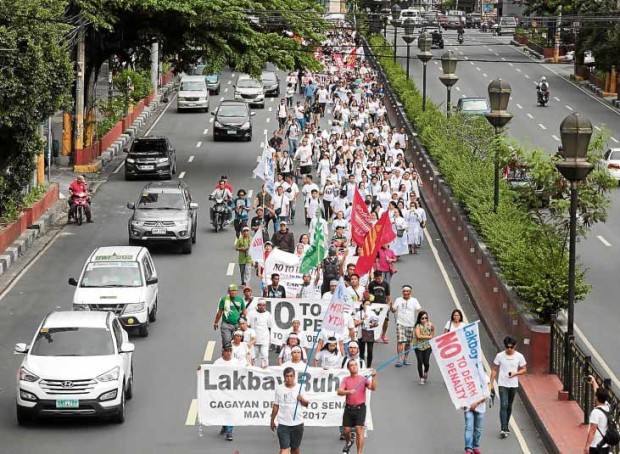
Human rights activists reject the reimposition of the death penalty in a march from Welcome Rotunda to the University of Santo Tomas on España Boulevard in Manila. —GRIG C. MONTEGRANDE
More than 400 people gathered at the University of Santo Tomas on Sunday to oppose the restoration of the death penalty in the Philippines.
Speaking at the gathering after a march called “Lakbay Buhay,” Sen. Bam Aquino said there was a lot of work to be done, especially because a recent Pulse Asia survey showed that 67 percent of Filipinos favored the return of the death penalty.
“It is not enough that we convince our legislators to vote against it. We should also convince the public that this is not just and this will not help curb crime,” Aquino said.
Inhumane penalty
Organized by 32 multisectoral organizations, the Lakbay Buhay caravan aims to unify the efforts of various groups that oppose the death penalty bill to increase public knowledge that capital punishment is “inhumane, ineffective and antipoor.”
The caravan began in Cagayan de Oro City on May 4 and will culminate on Wednesday in the Senate building, where the death penalty bill is to be discussed.
The House of Representatives approved in March the reinstatement of the death penalty for drug-related offenses.
Soc Banzuela, campaign coordinator of Pakisama (Pambansang Kilusan ng Samahang Magsasaka), told the Inquirer in an interview that the movement hoped not only to block the passage of the bill but also change the administration’s direction from reimposing the death penalty to improving the lives of the poor.
‘Pilgrims’
Banzuela said the movement had 15 “pilgrims” who represented the farmers, fishermen, urban poor, persons with disability and laborers.
In each of the 14 cities the caravan visited, Banzuela said the pilgrims highlighted their sectors’ core issues and called on the government to pay attention to their needs.
Randy Cirio, a farmer and one of the pilgrims, said he joined the movement because President Duterte appeared to have forgotten the poor.
“The issue of drugs is just a part of the social issues plaguing us. There are 24 million poor Filipinos right now and even if we get rid of the 4 million drug addicts, according to the government, there will still be some 20 million who may be vulnerable to the drug trade. A better solution is needed. Resolve poverty first,” Cirio said in a statement.
Apart from Aquino, Senators Antonio Trillanes IV and Risa Hontiveros also urged the organizers to continue informing the public why the death penalty should not be reimposed.
‘Restorative’ justice
In his homily, Manila Archbishop Broderick Pabillo said the kind of justice that the country should work for was the “restorative” kind and not the kind that was born out of revenge.
In her letter read to the crowd, detained Sen. Leila de Lima said the proposed reimposition of the death penalty was “discriminatory to the poor,” especially because most of those behind bars could not afford the services of lawyers.